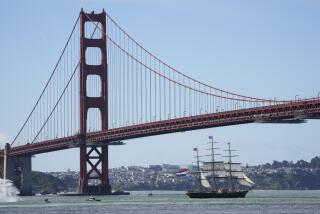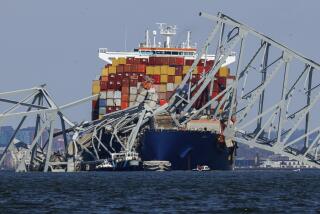Bay Bridge safety critics were told to keep quiet, report finds
SAN FRANCISCO — A report aimed at determining how delays, cost overruns and engineering problems that plagued the eastern span of the San Francisco-Oakland Bay Bridge might be avoided in the future describes “an institutionalized, if not malicious, lack of transparency” that kept important criticisms from the public.
Titled “The San Francisco Oakland Bay Bridge: Basic Reforms for the Future,” the report was commissioned by state Sen. Mark DeSaulnier (D-Concord) in advance of a Friday hearing by the state Senate Transportation & Housing Committee, which he chairs.
Authored by a former journalist, it draws on “dozens” of interviews and “thousands” of pages of documents. It is not an engineering audit so the report does not address ultimate questions of safety. Rather, it says, it is an attempt to determine how “key decisions” were made in hopes of avoiding similar problems in future state infrastructure projects.
Its conclusion: That a culture of silence quashed safety concerns expressed by people “with serious credentials.”
“It is the finding of this investigation that there appear to have been chronic attempts to keep many of the serious safety allegations quiet, put aside and not dealt with in an open, businesslike manner in the public’s best interest,” the report summary notes.
It references concerns about deck welds, “the now infamous anchor rods or bolts” on seismic stabilizing structures, which snapped, and “many other controversies” that came to light through the news media “rather than public disclosure by government agencies.”
The eastern span of the bridge opened after Labor Day weekend. At $6.4 billion, it became the costliest public works project in state history, coming in $5 billion over budget and years later than planned.
The report spreads blame for delays among the U.S, Navy, the cities of Oakland and San Francisco, environmental groups, the Metropolitan Transportation Commission, the state Legislature and “actions taken at the very highest levels of the state’s executive branch [that] also cost — rather than saved — time and money.”
But the harshest criticism is reserved for the way Caltrans treated those who raised concerns. Among them: One respected outside engineer was told he was being “too rigorous” in expressing concerns about widespread cracks in Chinese-made welds, an interview revealed. He also raised questions about the anchor rods and was told “basically to stop bringing it up.”
A Caltrans engineering colleague, meanwhile, was instructed “not to record his concerns [about the cracked welds] in writing, either on paper or email, but rather to communicate orally.” Both are scheduled to testify Friday.
Though the Toll Bridge Program Oversight Committee — a partnership of Caltrans, the Metropolitan Transportation Commission and the California Transportation Commission — was charged with overseeing the project with the goal of reining in delays and overruns, the report notes that it was given “extraordinary” exemptions from open government laws.
“It is apparent some serious adjustments toward more transparency will benefit everyone,” notes the report, which includes numerous specific recommendations to advance that goal.
Bay Bridge spokesman Andrew Gordon said the committee “is reviewing the report and its findings and will respond to the report and to the committee’s questions at tomorrow’s hearing.
“The report was written at the request of the committee’s chair, so it’s only appropriate that we respond to the committee,” he said.
Twitter @leeromney
More to Read
Start your day right
Sign up for Essential California for news, features and recommendations from the L.A. Times and beyond in your inbox six days a week.
You may occasionally receive promotional content from the Los Angeles Times.







